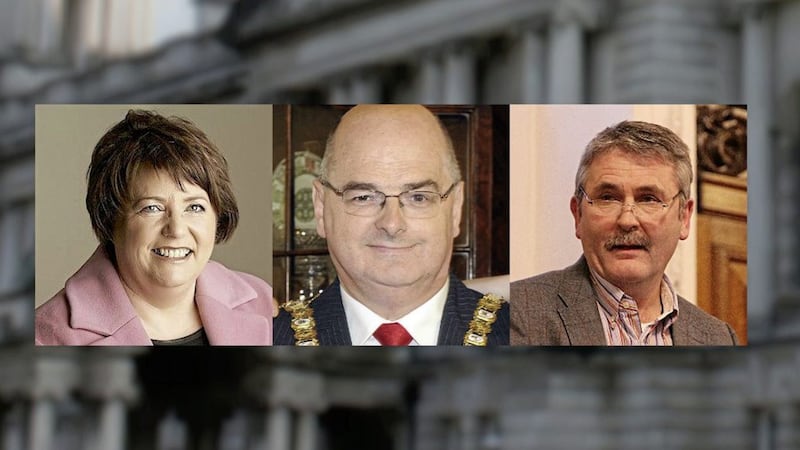Belfast DUP councillor Graham Craig has been criticised for sexism after telling the council’s chief executive that when she passes on her bicycle it “does quicken one’s step slightly.” Bad as that was, it pales into insignificance compared to another development at the same meeting. Three SDLP members abstained from a Green Party motion calling on the council to condemn “all harassment and intimidation taking place outside facilities in Belfast and Northern Ireland that offer reproductive healthcare, including attempts to physically block access to facilities, verbal intimidation, and the filming and recording of staff and clients entering and leaving the building.” Even the DUP had no issue supporting this - harassment and intimidation are criminal offences. It took three days for the SDLP to suspend the three councillors. Little wonder the party was muted about Mr Craig's remarks.
**
It is notable that Belfast City Council is making headlines while Stormont is not. New talks to reform the executive have begun, official timelines, deadlines and warnings have been issued and sombre party statements have been made. But apart from some breathless blogging about “ten days to save Stormont”, it is painfully clear that nobody gives a monkey’s. Sinn Féin seemed more interested in protesting against non-renewal of funding to Irish-language youth groups, without showing the slightest self-consciousness about its own role in putting government on autopilot. Of course, Sinn Féin has protested against itself before. When the DUP starts doing the same, a Rubicon will have been crossed.
**
Academics at Queen’s University Belfast’s School of Law have produced a detailed proposal to break the deadlock on dealing with the past. Their central idea is that all decisions to redact material on national security grounds must be made by an independent judge or panel of judges. Reaction criteria would explicitly rule out “activities which are illegal or historical counter-terrorist techniques which are now obsolete.” This would ensure that “national security can never be used as an excuse to hide past illegal activities or actions that are simply embarrassing to government agencies.” Perhaps the academics are unaware that, in the UK government’s view, historical counter-terrorist techniques never become obsolete. Two years ago, the Home Office and the Metropolitan Police refused to release 19th century files on Irish informants to a historian, arguing that to do so might imperil their descendants and compromise recruitment of future informants, who are promised anonymity forever. An appeal by the historian to the UK information tribunal was rejected.
**
After the EU revealed its Brexit negotiating strategy last week, Sinn Féin criticised the Irish government for not getting a good enough deal, with Gerry Adams ordering Taoiseach Enda Kenny to “put on the green jersey.” Sinn Féin also produced its own full alternative to the European Parliament’s draft negotiating resolutions, including such measured proposals as “the EU to acknowledge Ireland’s interests in the face of any aggression from Britain in relation to the territorial disputes surrounding Carlingford Lough and Lough Foyle.” Yet when the parliament’s draft was adopted unaltered this week, An Phoblacht hailed its “references to Ireland” and said Sinn Féin MEPs had “ensured” it passed (ie they voted for it.) This reveals Sinn Féin’s Brexit negotiating strategy - criticise everyone else’s work, wait a bit, then claim credit for it.
**
An air of unreality hangs over the row about bugging Ian Paisley snr’s phone. Former Labour deputy prime minister John Prescott claims Tony Blair told him of the eavesdropping in 2005. Blair denies this, while Ian Paisley jnr is now seeking answers about a “serious breach” of the Wilson doctrine, which prevents surveillance of elected representatives without Downing Street’s approval. However, Paisley jnr concedes any bugging would hardly be “shocking”, while nobody has mentioned the undeniable surveillance of Sinn Féin representatives, which makes all grand talk of a ‘doctrine’ hot air. At the 2004 Leeds Castle talks, the Sinn Féin delegation arrived carrying an enormous MI5 bug discovered in the rafters of party headquarters.
**
Tony Blair’s chief of staff Jonathan Powell played such a selfless backroom role in the Good Friday Agreement that many people were unaware it could not have happened without him - at least until his 2008 memoir set the record straight. Now “Britain’s chief negotiator during the peace process”, as he modestly styles himself, has returned unnoticed to our shores. Or so it would seem from an article in the New European newspaper, in which he writes: “you hear middle class unionists in the rugby clubs and the golf clubs saying ‘I never thought I would hear myself saying it, but perhaps we would be better off in a united Ireland if that means staying in the EU’.”
All polling on this subject finds that Brexit has had no effect (so far) on unionist attachment to the union, even among unionist remainers. But perhaps Powell’s on-the-ground research in north Down is more accurate. It would not be like someone from New Labour to just sex up what they think people want to hear.
newton@irishnews.com









